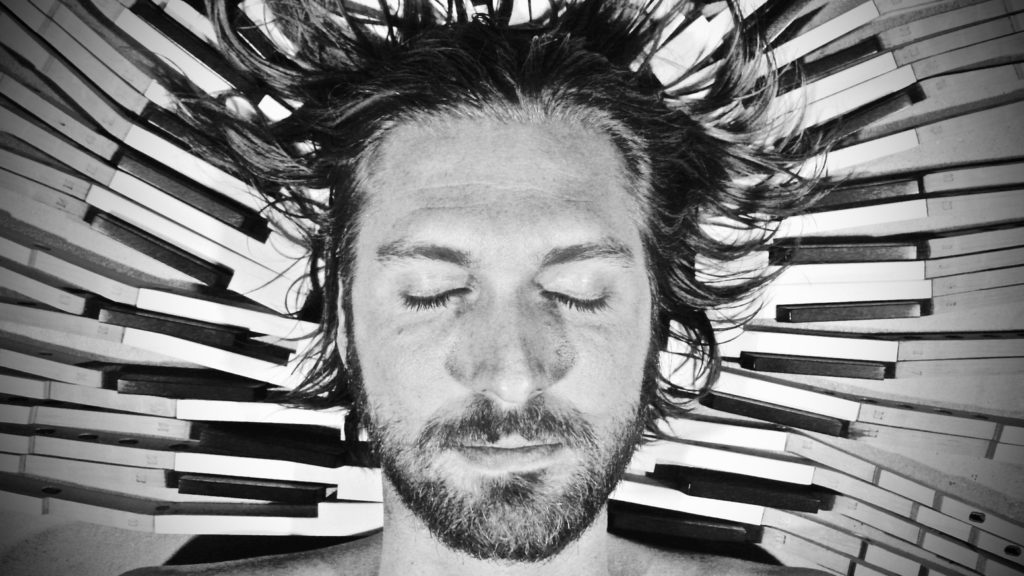

2020 was a mixed bag. There were a lot of positives, as well as interesting new developments in the worlds of science, politics and of course, music. That said, it was also a raging dumpster fire that many of us are happy to leave behind. So, I wanted to start this thing off on a sunny note and spread good vibes. The music of Drew De Four, and his wife Colleen (Kin Curran) does that for me. Maybe it will for you, too.
So, I hope you enjoy this “sit down” with Drew. Like his wife, Drew is kind, knowledgeable, and personable. As I mentioned in my previous write-up, you should always make the effort to support your indie’s. Drew De Four and Kin Curran are no exception. I implore you to head over to Drew’s site here, and Kin’s site here, and check out their incredible music. That will do for me, for now. Cheers.
Andrew:
Drew, thank you for taking the time to speak with us. It’s been a weird year, hasn’t it? What have you been doing to pass the time?
Drew:
It’s my pleasure. Thanks for taking interest in my passions.
2020…weird? Yes. However…we had our daughter this year and the other “Covid Baby” parents I’ve talked to agree that it is surreal doing most of the things we probably would have done anyways while the world outside our homes is seemingly imploding.
Raising our new daughter (Alethea) and 2-year-old son (Julien) is enough to fill your day, but luckily my wife is such a machine that I’m able to get a bit done in the margins.
The main event for 2020 has been D4 LIVE. For our own mental health and (to our surprise and delight) many others, we’ve performed 200 virtual concerts. Our fans have been so generous that we’ve stayed afloat during these extremely difficult times. A big part of our shows is taking requests, so I’ve spent a lot of time learning songs for some lovely people. I’ve probably done more musical study and learned more songs in 2020 than any single year of my life. My wife and I have played hundreds of songs we’d never even attempted before this year. Have found some new favorites. It’s been actually a really beautiful epoch in our lives.
Lastly, I’ve been finalizing an Independent Feature film I wrote, produced, and acted in called Duelers. It’s about the last night at a Piano Bar. I composed all the music too (about 30 original songs). I’m very proud of it and it should be out in 2021.
Andrew:
Tell us a bit about your backstory. How did you get into music? What was the gateway so to speak?
Drew:
There was a hand-me-down piano in my childhood home. It was nothing special, a Chicago Apollo Baby Grand. I still have it. It’s very beaten up. I once asked a great piano tech if it was worth restoring because I don’t think I could ever get rid of it, being the cause of my entire livelihood/marriage/etc. He said, “Drew, pianos are like people. Sometimes you just need to let them go.” Of course, I still have the piano and will never let it go. 🙂
But, I started playing that piano every day starting around age 3. I was making fun, simple compositions and playing by ear whatever sounded interesting to me. At age 7, I took piano lessons from my Aunt Helen and she mostly taught me theory (scales, chords, rhythms, etc.). She could tell I wanted to play popular music so she didn’t drill repertoire so much as insisted I learn the language of music, and how to just understand the instrument I was playing.
My parents and my friends got me into a lot of popular music. My first CDs were Live, Foo Fighters, Collective Soul, Blues Traveler. But my Uncle was giving me Beatles and Queen CDs/DVDs and my best friend was playing Flaming Lips and Guns N’ Roses because his sisters were listening to those bands. By age 12, I had quit piano lessons, started teaching myself guitar and bass, learned a ton of cover songs, began composing original music (instrumental piano and singer/songwriter Pop), started a band with my brother and best friend Ryan, and never really looked back.
Andrew:
As an artist, who were some of your earliest, and most important influences?
Drew:
My Mom played guitar and sang. She was a Folk singer/coffee house performer in the 70s before she got married and had 5 kids in the 80s/90s. Hearing her play guitar, and sing probably was the catalyst for my ability and passion for music. My Aunt Helen was profoundly important in how she taught me music and she had such a passion. My school music teacher, John Vallance really encouraged me to perform. I was probably his “go-to” in class and I was too big for anyone to pick on for singing the loudest and always raising my hand (I’m 6’7).
Famous music influences: Queen. I just loved Freddie Mercury from a young age. I loved the Beatles. I loved music with the piano. I learned “Everything I Do, I Do It For You” in 1994 (I was 11), and really loved a good Pop piano arrangement.
I mainly just kept learning whatever sounded good to me. My Dad showed me the music video for ‘Piano Man’ one day when it came on VH1. He bought Billy Joel’s Greatest Hits and I was learning those songs before I was a teenager. I played “Piano Man” at my first public performance – my 8th Grade Dance. Also played ‘Let It Be,’ ‘The Freshman’ (by The Verve Pipe), Glycerine by Bush, “White Discussion” by Live…it was the quintessential 90s cover performance. Also played a few original tunes too. That concert was a defining moment in my life.
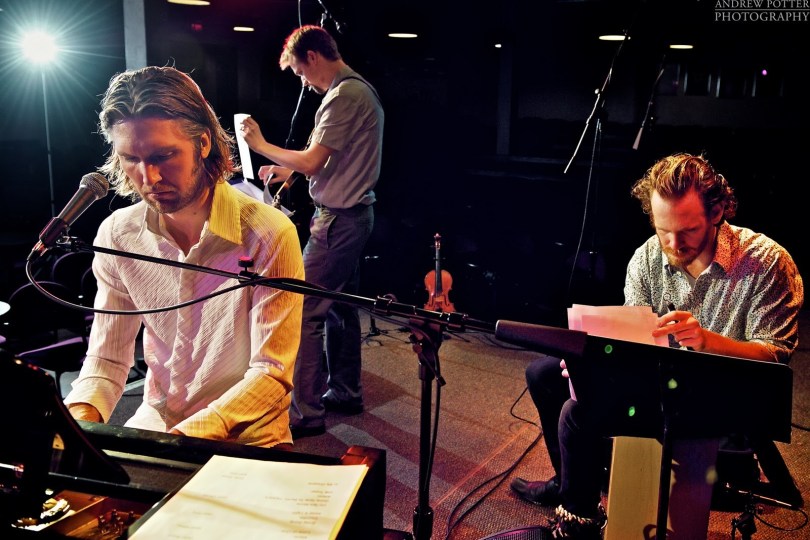
Andrew:
The way I became familiar with your music was through your dueling piano shows you perform with your wife, Kin Curran. You guys are incredible. How did you get into the dueling pianos scene?
Drew:
I was a freshman at Eastern Michigan University where I studied for 3 semesters before transferring to the University of Michigan (that’s a long story for another time). I saw a flier for a new club that was being built: PUB 13. I read “Dueling Pianos” and was totally taken aback. The description sounded like what I had been doing for the last 8 years: learning songs and singing them to audiences. That club wouldn’t open for another year, but I used my (probably dial-up) internet in my dorm room to find that there was another Dueling Pianos Club in Michigan called JD’s Key Club in Pontiac, MI. I drove there and auditioned for the 4 man team that was currently employed. I played “Piano Man.” and “Bohemian Rhapsody.” They dug it. I started going there (an hour drive each way) from school 4 nights a week. I was listening to songs in the car, learning the lyrics. I was doing homework on my breaks. I was 19 and got my first paid shift. It was incredible.
I remember going back to school with so much tip money that I’d just buy everyone pizzas and such. I didn’t know what to do. I was making more than some of my professors! I was also learning a TON. My piano professor at Eastern Michigan (this was the only other year of my life besides 7-12 that I studied piano) told me I should probably not be going to school for piano because the things I wanted to learn were not really passed on in academic settings. I was attending the University of the Back Room at Piano Bars.
Shortly after that, I transferred to the University of Michigan to get more of a general education, study theater, and meet a ton of incredible people that I would later collaborate with.
Anyhow, I played at JD’s Key Club for 2 years. Then someone came in from the “circuit” and asked me to play at Rum Runners in East Lansing. Someone there invited me to Mishawaka. Then Chicago. Milwaukee. Boulder. Vegas. LA. NY. Switzerland. UK. Caribbean and Mediterranean Cruise Ships. Military Tours in the Asian Pacific, and the Middle East. National Festivals in the US and Canada (particularly the PNE in Vancouver). It’s been a wild ride. Dueling Pianos has been an amazing day job while I pursue a career as a recording artist and singer/songwriter.
Andrew:
In addition to your solo output, you’ve recorded extensively with your wife, Kin. What’s it been like working with her? Do you guys keep one another motivated creatively?
Drew:
Colleen and I move as one so to think of myself separately from her is strange. We don’t necessarily motivate each other because we are already motivated. We are both driven to live this life 100% to its fullest. We both divide up our passions and responsibilities very neatly. She’s always wanted to be a backing vocalist so she does that with me almost all of the time.
I’ve encouraged her to be her own artist, going so far as to produce about 4 records for her since 2002 (2 available on Spotify under her performing name: KIN CURRAN). But when we need to be creative, we just are. We’ve written so many songs and given each other so much input that we just do it when we want to do it. Between us, there are about 12 records out and this upcoming movie will include new music as well. Lots of output. It’s slowed down in the last 2 years, having 2 kids. But that’s expected. I’d say once we “get Thea off the boob,” the output will pick up substantially; it already has with each month she and her brother are less dependent on us for every single thing.
Andrew:
I’ve kept up with all of your work over the last few years, but one album that means the most to me and my wife is Humanist Pop. What can you tell us about that album? What inspired you?
Drew:
I recorded this with some very talented friends from the University of Michigan: Theo Katzman, Woody Goss, Joe Dart, and Tomek Miernowski. I wrote the songs and they played them live in the studio. I tracked piano and vocals later.
The songs are completely focused on humanism/stoicism: being present, in the moment, doing your best in this short life. I could go track by track:
‘Be Here With Me:’ title says it all. Living in the past makes you depressed. Living in the future gives you anxiety. Live in the present.
‘My Best:’ pretty much my wedding vows to my wife. “I will give my best to you, all the days of my life.”
‘Neverlove:’ a song about the romances that never could be. I say the album is about being present, but part of being present is really embracing the pains of life. If you are a faithful spouse, you are denying billions of other relationships and there is some pain there in the death of possibility. Any happy couple will tell you it’s worth it to give up those many possibilities for the sake of a great one.
‘Books:’ we won’t continue the bad traditions of our elders, but their love (the life-giving, healthy things they teach us) will go on.
‘Come On Down to the Sip:’ just a silly song about my favorite bar in Upstate New York.
‘Mamamosito:’ It’s about Colleen’s best friend. This is a combination of mamasita and mojito.
‘Honey:’ just a fun song.
‘Can I Bee?:’ It’s me beat boxing and singing at the same time. I had to find words that allowed me to do this (B gives you the kick drum… Ks give you the snare…Ts give you the hi hat…)
‘I’m So Happy:’ Just a song for my wife about not needing to be anywhere else or with anyone else.
‘Without You:’ How I feel about my wife.
‘Annie’s Grave:’ It’s a very dark song to all the destructive narcissists who torture everyone around them and essentially the only good thing they can do is apologize before they die…and if not, then just please die and be gone. “Annie’s grave is all she can give this world.”
‘Boys at the Sky and Ground:’ I got bad tinnitus and a lot of fatigue touring most of the year for almost 10 years. I considered quitting music and this one night in Wexford, Ireland really inspired me to keep going.
‘For the Best:’ It’s okay to die. Don’t be afraid and appreciate that our lives and relationships only have value because they end.
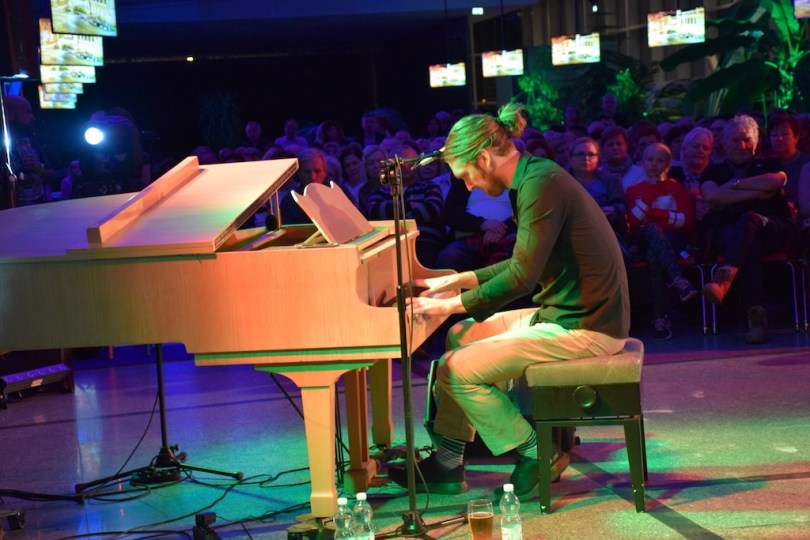
Andrew:
What’s changed for you compared to your early days? Are you a better player now than ever?
Drew:
I’m better at the piano and singing every year because I am consciously thinking about it and analyzing what I’m doing. I’ve always been someone who plays by ear. Early on, this was enough to learn a song like ‘Piano Man,’ albeit without all of the nuances that Billy Joel brings to his piano voicings. Now, I hear the difference between very complex chords and this is from years of studying, listening, reading sheet music after doing my best to decipher the correct notes by ear…just this week I learned ‘Skating’ by Vince Guaraldi all by ear. I checked an online tutorial and I was 95% right. It’s not over-complicated, but it’s just something I probably couldn’t have done 10 years ago so I feel like I’m still growing.
Andrew:
Let’s talk about the state of music, in general, a bit. In your opinion, what’s the state of the music industry these days? What are some things that need to change?
Drew:
The state of music directly correlates to the state of the economy. Imagine every business fighting their way to either: massive success, massive failure, or success that leads to a buyout, or success that leads to a competitor attempting to snuff them out. You’re left with only mega-corporations and a small, but a strong niche market. The middle class is dead – in music and in the economy. This means that your local brick and mortar is put out of business by Amazon and your local artist is probably put out of business by the 100 artists that struck gold in the 80s/90s and are still putting out albums today to great success off their name recognition. It’s a vicious cycle.
That’s not to say I’m cynical. I think it’s a good fight. But streaming services have devalued the record industry and so artists cannot sustain themselves on recording alone. And touring was destroyed by Covid, so in many ways – artists are simply tapping out right now.
Moving forward, the fate of the middle and working class in America will be the fate of artists. If there is no economy for records or live performance, maybe a Universal Basic Income (paid for by the enormous profits of mega-corporations like Amazon, Spotify, and Facebook) will allow people to still survive and even flourish/be creative or productive.
Andrew:
In the world we live in today, we are more or less dominated by the never-ending barrage of social media. How has this affected music as an art form? Is an artist’s ability to get their music out there hindered by all this, or helped?
Drew:
The amount of content available to us all is overwhelming. But the cream still rises to the top. Fads are fads and they are fun but fleeting. A quality song can be something you discover 50 years after it was recorded and still find value in it. I am currently loving “Ashes to Ashes” by David Bowie, ‘Songbird’ by Fleetwood Mac, and ‘Amongst the Waves’ by Pearl Jam. These are not new songs, but I found them this year. If anything, the songs being released currently reflect the need for QUANTITY over QUALITY, so very little of what is being released in the last 5 years is STICKING. This is evidenced to me by the fact that only 1-2 songs each year are staying “up on the piano” (as I call it). Being requested nightly or weekly. The last big song was ‘Old Town Road.’ Before that, ‘Shallow’…’Uptown Funk’…modern music isn’t as strong and that’s because it’s planted without the same care and attention that music of the past was given…hence the roots are “Shallow” 🙂
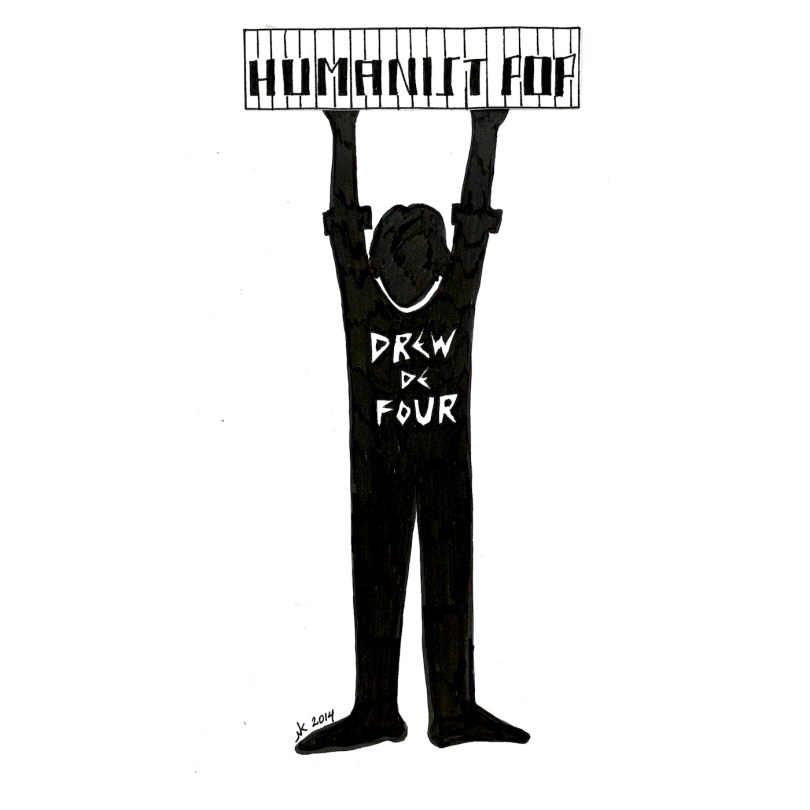
Andrew:
Who are a few artists, past or present that mean a lot to you?
Drew:
Tom Waits. His songwriting is theatrical and narrative in nature and so is his performance. This is much more powerful than simply putting ideas or philosophies out there (which I am prone to as a writer/Philosophy minor). Humans have experienced life through storytelling for millennia and so it is a much better vehicle for delivering information, ideas, and emotions than almost all other forms…like poetry, stream of consciousness, dadaism…etc. There are so many ways to express oneself in words/music, but Tom Waits is just so effective. He also made me feel confident that being a Piano Bar entertainer could be original, authentic, and “cool” if you will. I saw him in Scotland in 2009 and I said, “He’s doing all the shit that I’ve been doing for the last 7 years at the piano bar…but he makes it cool!” I had felt a little corny/cliche at times in the piano bar world so I needed that education in what could work in the setting that I make a living from.
Without the explanation, other favorite artists include Pearl Jam, Peter Gabriel, The Afghan Whigs, and Aaron Copland.
Andrew:
What are a few albums that mean the most to you and why?
Drew:
Live – Throwing Copper. It was the first album I just listened to over and over. So many good songs. The lyrics were very inspiring. The drummer on that album is so grooving.
Tom Waits – Mule Variations. I got into singles of Waits at first – ‘Time,’ ‘Tom Traubert’s Blues,’ ‘Clap Hands,’ etc. But when I heard ‘Hold On’ for the first time and then started plowing through Mule Variations, I saw the entire spectrum of what Tom Waits was capable of. Then a friend who writes for Pitchfork gave me his entire catalog from a hard drive – 20 albums or so. I was hooked. I paid 300 quid to see him in Scotland so I felt at peace about the music piracy.
Chantal Krevuziak – Hard Sail. Chantal is a Canadian singer who had some amazing hits in the 90s and married Raine Maida from Our Lady Peace. I love Hard Sail because it is just an incredible album that she clearly made on her own without industry influence (or backing, apparently, as she said there was no push behind the record for her and it was disheartening). Anyhow, her talent is undeniable and this record is just world-class. It made me feel like the point was to make great music and not worry about commercialism. I love this record. Many love this record. Make good records.
Afghan Whigs – Black Love. My favorite album. It’s dark and yet optimistic. Painful and yet feel-good. I identify with Greg Dulli’s aesthetic very heavily.
Andrew:
Aside from music, what else are you most passionate about and why? How do your other passions inform and inspire your music?
Drew:
Film, but that’s very similar – so how about basketball? I love sports. It’s its own aesthetic. Who wins? Who loses? There’s an actual metric to determine the hierarchy of ability in this system, but it’s still beautiful to see how it all plays out. Culture is a big part of winning in professional sports. And I love seeing a beautiful “system” win out. You can’t JUST have talent. You have to have a CULTURE that is strong top to bottom. The person cleaning the toilets in the arena needs to have that buzz about them, that this entire endeavor is worthwhile and worth giving your best every day. So, ownership… superstars…managers…trainers…fans…they all play their part in a Team, a CITY winning a championship. It brings out the best in people, I believe that.
This is similar to a great album being made or a great movie being filmed. It takes a strong CULTURE to make great things in this world. I’ve had some phenomenal people involved in my projects over the years. Just the drummers I’ve recorded with alone:
Theo Katzman: Vulfpeck
Dave Scalia: Elle King
Adrian Passarelli: Nelly Furtado and Allesia Cara
Have been fortunate to work with Chris Kuffner who performs and records with Ingrid Michaelson. Have worked with Phredley Brown who is Bruno Mars’ music director.
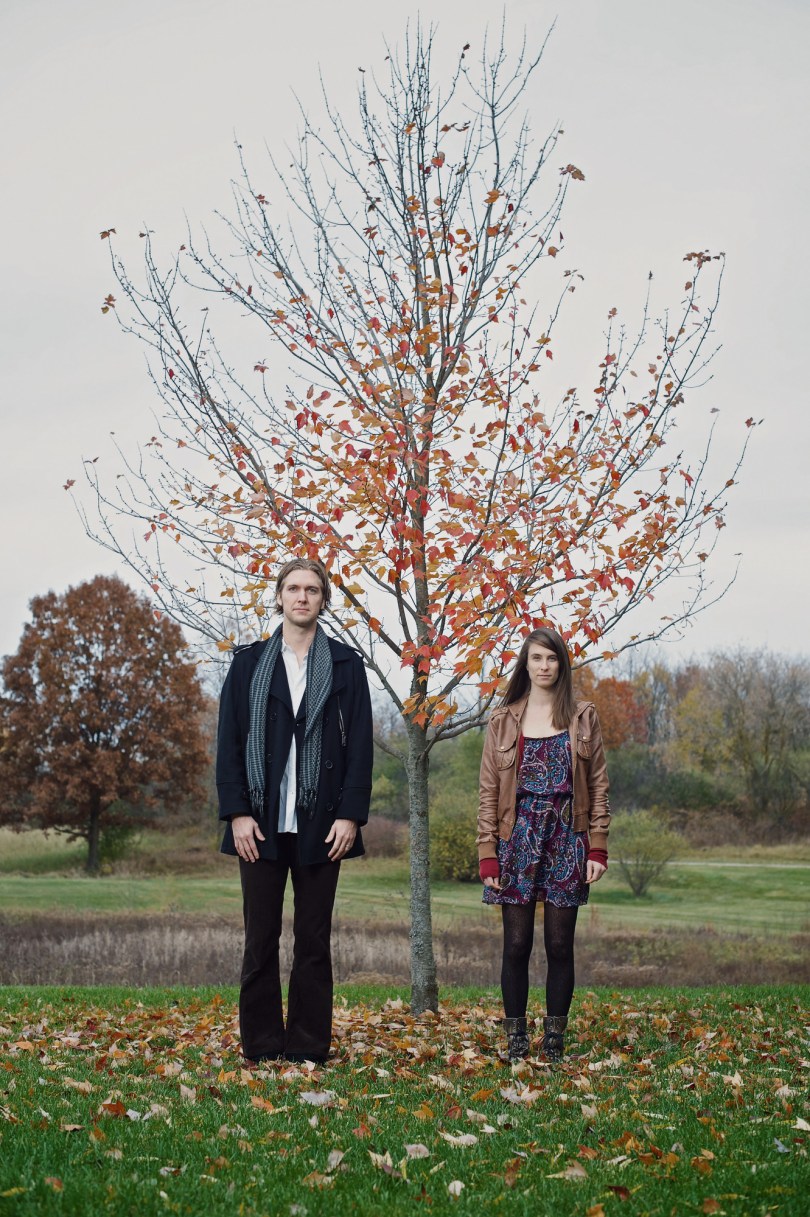
Andrew:
Are you into vinyl? Tapes? CDs? Or are you all digital now? Where do you like to shop for music?
Drew:
I enjoy vinyl a lot. It’s an experience. I’m not religious about it. I made a vinyl record from top to bottom with NO digital tools (not even a digital FX pedal for the guitar). We recorded straight to 2” tape, mixed through an analog console to 1/4” tape, mastered to plates, pressed to vinyl. No computers. It was absolutely insane, painful, fun, inspiring… and I’ll maybe never do it again. Not worth it. I just want the music out of my own hard drive. Getting all my ideas out into the world is not worth worshipping a dated art form (analog) that is beautiful and has strengths, but enough weaknesses to not deify. Digital is the way. I shop for music at a local record store (before COVID), and we made a habit of getting the best $1 bin finds we could get… and then getting one QUALITY record from the main section.
I still rock CDs from time to time from my 90s collection. But, like everyone, I’m seduced by the ease of digital and streaming.
Andrew:
Your most recent studio effort was Amavita. Great album. Once COVID-19 calms down, what’s next?
Drew:
Thanks. It’s a very intense effort and I mixed/mastered it to see if I could (I’m only partially happy). Would love it remixed one day…most of my catalog actually. But I don’t have time to revisit most of my old stuff with so much yet to do. Like Bob Dylan wrote, “She’s got everything she needs, she’s an artist, she don’t look back.”
We’ve got a movie due out this year (2021) called DUELERS. It’s my most ambitious project to date. An original screenplay with 20+ original songs (only 5 new ones).
Colleen’s next album is due to be produced. I want to record all the songs I used to perform with my high school band because my brother Mark (who passed away in 2003) has a son that is almost 18 and I want him to hear all the songs I used to do with his Dad. The record would be called Amadeus (the name of our band). I want to do an album covering all the songs of my friends – they all seem to have one song that I really connect with and I’d love to have them all in one place. I’d like to record my Piano Solos Vol. 2 (11-20).
Otherwise, I’m not inspired to write a ton of music at the moment because I’ve got such a backlog of projects I want to record/produce, Also, I’ve already said a lot of what I want to say about most things (how many times can I tell my wife I love her in ANOTHER song?), and I’ve got a 1 and 2-year-old to raise with said lovely wife.
In an ideal world, the movie gets some recognition, it helps us raise more awareness so we can tour and stream our shows more successfully and fund even more projects as well as keep paying the bills.
Between our 200 D4 LIVE shows this year on Facebook, 20 shows I played to start the year, and 15 virtual shows, I’ve performed more this year than any year of my life and that’s with those two kids. I’m really proud of that and after some time off in January, I’m excited to get back at it with even more enthusiasm than ever.
Andrew:
Last question. You’ve been at it for a while now, with hopefully a-ways to go still. Looking back, what are some of your proudest moments as an artist?
Drew:
Last November, before the pandemic, I got to perform for 600 people at a historic theater in Krakow and it was a night to remember. Very proud of that show and how I got to play it.
But this year has been my proudest. We’re told in many, many messages/gifts/tips that we are helping people get through this difficult and painful time in human history.
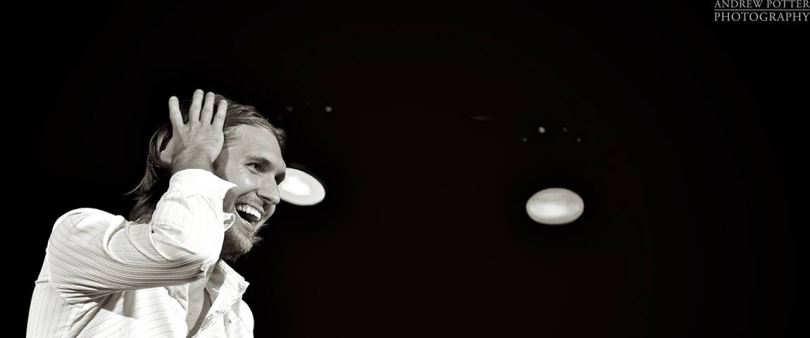
Dig this interview? Check out the full catalog of Vinyl Writer Interviews, by Andrew Daly, here: www.vinylwritermusic.com/interviews
